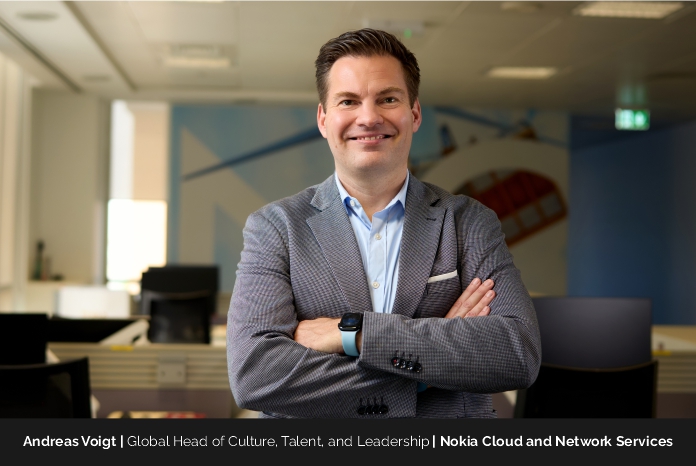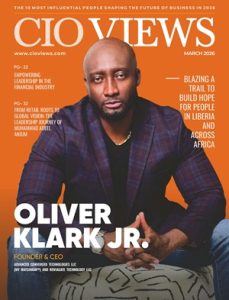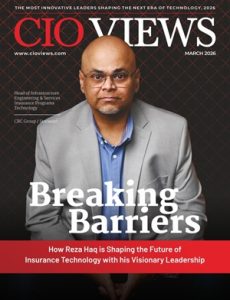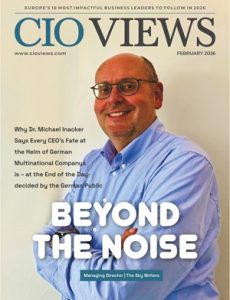Andreas Voigt, Global Head of Culture, Talent, and Leadership at Nokia Cloud and Network Services, is not defined by one discipline. He brings a globally attuned career that bridges research, consulting, entrepreneurship, and industry. His work has been carried out across continents and sectors, from life sciences and finance to technology and FMCG. This breadth gives him a truly worldwide outlook. Today, he applies this breadth to ensuring that culture, talent, and leadership function as strategic levers for business impact. With a strong grounding in organisational psychology and over two decades of international experience, Andreas sees people, purpose, and performance as interconnected drivers of growth in a fast-moving industry.
From Research and Consulting to Real-World Business Impact
His approach to leadership draws on a career that has bridged research, entrepreneurship, and global consulting. At INSEAD and later at London Business School, Andreas built an early foundation by studying how culture influences collaboration and the success of complex M&A integrations. Those years instilled a belief that business transformation must be rooted in evidence while remaining attentive to the people factors that drive change with a future focus.
At Accenture Strategy, he experienced a high-performance culture firsthand. Andreas saw how a workplace of ownership and accountability could cascade through every level of the firm, creating a powerful model of scalable leadership.
Each chapter of his journey has reinforced a central conviction: “Impactful leadership requires precision with regards to understanding data and facts, pragmatism in taking decisions and actions to enable the business, all on the basis of deep human understanding.” Andreas believes, “It is in combining these dimensions that leaders, and the organisations they serve, achieve lasting success.”
Turning Points in Leadership
Two defining experiences influenced Andreas’s leadership. His time as a Founding Member with the Hot Spots Movement, a startup out of London Business School, pushed him to think and act like an entrepreneur. Every day demanded commercial focus, creativity, and the ability to act with purpose even when the path ahead was uncertain. Coming from a research background, this was a shift that taught him to pair innovation with pragmatism, while staying close to customer needs and leading with purpose and vision. Mentorship from Lynda Gratton, a leading voice on the future of work, further accelerated his progress.
Later, as Associate Partner at Korn Ferry, Andreas took on the challenges of global account management and leading a large and global operational team for delivery. Here, he balanced the demands of C-suite clients with the need to coordinate delivery across borders, all while motivating a diverse workforce. The experience reinforced the value of listening to stakeholders at every level, leading with a vision that instils pride, and creating space for young talent to step up.
Together, these events solidified Andreas’ belief that leadership flourishes by staying attuned to people, optimising for business results, and keeping sight of a vision that unites teams and drives lasting impact.
Building a Culture of Belonging
Cultural transformation is essential for business success in a competitive arena. Four years ago, the creation of Nokia Cloud and Network Services marked a new era. A “Culture of Belonging” was introduced, with inclusion placed at its core. Employees were invited to opt in, shaping culture as an active choice rather than a mandate.
To embed this vision, an international volunteer network of more than 400 leaders and contributors was created. Their task was to link culture and change with business priorities. While global behaviours ensured consistency, regional teams adapted them locally. This gave employees both a collective identity and space to reflect on local needs and traditions.
Change management was integrated into the operating model. Dedicated change leads used survey insights to support reorganisations and connect engagement with measurable outcomes. A unified framework was designed, while remaining flexible for different business areas and hub locations. Analytics benchmarked behaviours and introduced micro-actions, making culture measurable and actionable. Transformation became visible in daily interactions, in how managers guided teams, and in how leaders set the tone. By connecting belonging with results, Cloud and Network Services built a culture capable of thriving in disruption while staying tied to business impact.
Nokia’s Future Culture Direction
Across Nokia, culture is now being aligned around high performance with customer needs at the centre. The emphasis is on working as one team, strengthening collaboration, and embedding customer focus as a driver of performance. This evolution is aligned with a ‘Play to Win’ culture theme created in Cloud and Network Services over the last few months and reflects Nokia’s broader ambition for its people and business.
Influencing Culture and Talent in Tech’s Fast Lane
Although external recruitment provides rapid access to new expertise, it often proves to be an expensive and lengthy undertaking. Andreas is aware of it. So, he emphasises that the real advantage lies in retaining talented people who already know the culture and the strategy. Building a sustainable internal talent pipeline for leadership succession is what will make one successful in the long run. That means putting money into growth, development, and recognition, which can be hard to do in places where technology R&D is a big part of the job. “You only belong if you feel included,” Andreas underlines. “By linking belonging with high performance, and global consistency with local expression, you built a culture people opt into to thrive in disruption and deliver business impact in an agile way.” He feels that culture and homegrown talent must evolve together.
Programmes That Power Leadership and Talent Growth for Engagement at Nokia
At Nokia Cloud and Network Services, Andreas shares two standout programmes that are shaping employee growth and engagement. One is a multi-year leadership journey he has designed and implemented, which has built Influencer and Multiplier communities of 400+ mid-level leaders, empowering them to turn strategy into action through experiments, real-world challenges, executive mentorship, and collaborative innovation. Talent Power in You is the second lighthouse programme, responsible for supporting Nokia Cloud and Network Services’ top 50 high-potential leaders based on their career aspirations through external assessments based on future leadership requirements, executive coaching, and structured development paths tied to succession planning.
Both programmes focus on practical growth, ownership of teams and individuals, and aligning leadership and talent development activities with long-term business goals.
Shaping Leadership Development for Business Impact and Inclusivity
Preparing leaders for the future is an investment that never depreciates. Andreas regards the principles of effective leadership development with a strong business impact as universal. He believes, “True growth requires stretch, moving leaders outside of their comfort zones, with clear behavioral commitments to spark and sustain change.”
To him, effective learning comes from real experiences tied to strategic and day-to-day challenges, supported by peer networks and guided by senior leaders. This ensures new skills are practised, embedded, and sustained over time.
Andreas points out the need for a unifying global philosophy that defines strong leadership while remaining flexible enough for regional and local adaptation. Inclusivity should be built into every program, ensuring representation across gender and regions. In India, for instance, global initiatives are complemented by local programmes for first-line managers, designed to provide practical tools, foundational skills, and peer communities rooted in regional challenges.
As leaders advance, global connections are built across three to four levels below senior executives, reflecting the demands of operating in a worldwide business environment. Leadership development thus remains inclusive, regionally relevant, and equips rising leaders for their global future.
Collaboration as the Engine of Culture and Leadership
Collaboration is at the heart of Nokia’s leadership programmes and culture. For development to truly drive transformation, it must be tied to real business change with executive backing, ensuring it makes an impact. Andreas describes Nokia as naturally collaborative, with cross-functional teamwork embedded in daily work.
The real challenge is creating shared purpose across global teams while keeping things clear and focused. This requires coordination across time zones, flexibility, and space for human connection.
Inclusion is also essential. To foster the diverse workplaces of Nokia Cloud and Network Services, the business group recognises global achievements, represents local traditions, and values its inclusivity. For Andreas, the mix of connectivity and differences makes each person feel seen and gives them the sense to succeed together.
Leading Through Crisis with Integrity
The COVID-19 pandemic led to a complete standstill. Andreas’s leadership philosophy was placed under real-time scrutiny.
At the time, he was engaged in consulting, a field where financial performance often eclipses other considerations. As the economic shock unfolded, layoffs spread like wildfire. What really got under his skin was not the decisions themselves, but the lack of openness in how they were made and communicated. That period crystallised his conviction that integrity must remain imprescriptible. He learned that transparency and accountability are not optional ideals but the foundation on which trust is built. From then on, he resolved to lead with integrity every day.
The lesson has stayed with him. Upholding integrity has sometimes required difficult conversations with senior executives, creating what he calls “productive tension.” The intent behind such discussions is that the right choices prevail.
At times, however, resistance was met when uncomfortable truths were placed on the table. For Andreas, those moments reinforced a truth he carries forward. “In moments of uncertainty,” Andreas notes, “how leaders show up — with honesty, accountability, and integrity — shapes not only outcomes, but also the culture and trust that carry teams through crisis.”
Advice for Emerging Leaders: From purpose to business opportunities and growth
To Andreas, knowing one’s beliefs, purpose, and area of greatest impact should be the first goals of the leaders who aim to grow. This sense of direction creates the very foundations of personal and professional growth.
Andreas recalls a key moment early in his time at Nokia. When a sudden change in structure after his arrival made him rethink his corporate role, he made a move into business HR by clearly stating his goals and the value he could bring from a business perspective. This gave him the power to shape the culture of a newly created business group, and he was tasked to design and implement critical leadership programmes across the business.
He stresses the importance of maximising business engagement wherever possible, especially for HR professionals. It’s a skill Andreas honed during his Consulting years. Something that has helped him secure buy-in for key programmes and the budgets to support them. Finally, Andreas advises, “Don’t shy away from conflict.” He urges the aspirants to maintain a calm demeanour to communicate effectively but with passion when differences arise.
Andreas emphasises that authentic leadership in a global organisation is purpose-driven, business-grounded, and resilient.
A Day in the Life of a Global Leader
Andreas’s days are a real juggling act, balancing eight to ten meetings with teams, partners, and senior executives. He keeps mornings reserved for meditation, exercise, and focused desk work on programme planning or workshop design. One-to-one coaching sessions give space for individual growth, while shared platforms for collaboration and clear structures foster creativity and ownership in the teams he is leading. Evenings after 8 p.m. are protected, and weekends are reserved for family whenever possible.
Finding Personal Focus and Balance in a High-Impact Role
Balance starts at home for Andreas. Splitting his week between the office and remote work in Dubai allows him to stay closely connected with family. His three-year-old daughter brings daily joy and energy, while his 21-year-old son, studying at the Technical University of Munich, offers perspective and a sense of legacy that extends well beyond work. Personal purpose and impact are felt in these moments.
Long days and global travel are part of his reality, but structure keeps him grounded. Weekends and holidays are reserved for his children whenever possible. Discipline also extends to his well-being. Daily meditation, practised for eight years, is seen as a vital source of focus.
Running along Dubai’s beaches and working out in the gym helps this industry veteran restore strength. At the same time, a fitness-tracking community with colleagues injects a healthy dose of accountability into the mix. Through these practices, the capacity for high performance and new daily challenges is consistently built.
How Nokia’s Global Footprint Shapes Leadership and Talent Strategy
Andreas explains that Nokia’s global scale affects its leadership and talent strategy by finding a balance between being consistent around the world and being relevant in each business group and market.
At Cloud and Network Services, leadership communities are based in regional hubs but have a global perspective. This keeps Nokia accessible to everyone, no matter where they are, and ensures that its growth and succession plans reflect its diverse workforce. Leaders in important markets need to remain involved and visible, which shows that leadership is about being there as much as stepping up to global challenges.
Mobility in Nokia aids in attracting and retaining exceptional individuals. Relocating for work opens up new opportunities and increases your motivation. He states that moving to the UAE from Germany, as well as having lived and worked in the UK, USA, South Africa, and Singapore throughout his career, changed his viewpoints and appreciation of different cultures and work styles. Nokia’s strength is that it creates gateways for global careers. For instance, skilled engineers and executives from countries like Brazil or India are frequently deployed in the United States and Europe as they grow into new leadership roles.
These changes make Nokia executives better and guarantee that they support the company’s global objective. Andreas adds that being a global leader is also about having a common goal, being able to grow in different ways, and finding ways to use talent wherever it is, leveraging remote and agile ways of working.
The Legacy to Leave at Nokia
As Andreas puts it, “If there is one legacy I want to leave, it is this: that culture, talent, and leadership are recognised as integrated strategic levers for business success.”
Reflecting on his four years at Nokia Cloud and Network Services, he hopes his legacy is a mindset shift.
The objective is to embed people initiatives into the framework of the business. They are crafted hand in glove with leaders who tackle real challenges and deliver measurable impact. By moving away from conventional training methods, Andreas believes this change will pave the way for a new era in leadership at Nokia.





